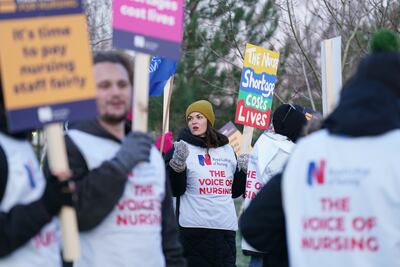Nurses kicked off another two days of strikes on Wednesday as the government warned of an “inevitable” impact on patients.
The Royal College of Nursing (RCN) walkout affects England and comes after the union led the first nationwide strike in its 106-year history in December.
Speaking to Radio 4 on Wednesday, RCN chief executive Pat Cullen said: “Fundamentally this is about nurses speaking up on behalf of their patients and saying to the government, stop turning your back on us.
“Because when you turn your back on nurses, you turn your back on patients.
“The NHS is in an absolute crisis. Every single nurse is feeling the pressure every single day.”
The main nursing union accuses the government of failing to negotiate seriously on improving their pay deal for the current year.
Ms Cullen said no new pay offers have been put to the union since the first strike in December.
“We need to address pay for 2022/23. That’s where our formal dispute sits at this time.”
Speaking at Prime Minister's Questions, Labour leader Keir Starmer said the NHS is in crisis on Prime Minister Rishi Sunak's watch.
He gave the example of a heart attack victim calling 999, pointing out that in some areas of the country, such as Plymouth, it would take several hours for an ambulance to arrive.
The Prime Minister said: "We will improve ambulance waiting times as we are recovering from the pandemic and the pressures of this winter."
If Mr Starmer "believes so much" in reducing ambulance response times he should support the government's move to introduce minimum service levels in certain sectors to limit the disruption, including rail and ambulances.
Meanwhile, on Wednesday the GMB union announced four more strike dates involving more than 10,000 ambulance workers, including paramedics, emergency care assistants and call handlers in February and March.
The union's members plan to walkout on February 6, February 20, March 6 and March 20.
This week's walkout piles further pressure on the state-funded National Health Service at a time of peak demand and lengthy waiting lists for treatment.
Estimates by the NHS Confederation suggest this week’s strikes will result in about 4,500 cancelled operations and 25,000 cancelled outpatient appointments.
Further strikes are planned for February 6 and 7 by the RCN union, which said they will “be at the highest intensity in our history”.
The strikes next month will not take place in Scotland or Northern Ireland.
“It is inevitable industrial action will have an impact on patients,” Health Secretary Steve Barclay said on Tuesday.

Two days of strikes by nurses in England and Wales in December led to the cancellation of about “30,000 elective procedures and outpatient appointments”, Mr Barclay said.
“Patients will understandably be worried by the prospect of further strike action by nurses.”
Yet the plight of medical staff is generating public sympathy as soaring food prices and energy bills hit lower-paid workers across the board.
A YouGov poll on Tuesday indicated 63 per cent of people support the nurses' strike.
But Mr Sunak's official spokesman on Tuesday said that it is not “the right course of action”.
“We continue to call unions to step away from the picket lines and continue with discussions.”
Matthew Taylor, head of the NHS Confederation, which represents state healthcare providers in England and Wales, on Wednesday urged ministers to renew pay talks with trade unions.
“Our message to the government is to give the NHS a fighting chance and do all you can to bring an end to this damaging dispute,” Mr Taylor said.
A union representing ambulance workers, the GMB, is also expected to announce on Wednesday that it will resume strike action.
Ambulance drivers and paramedics this month held their second walkout in two months over pay and conditions.
Nurses strike in the UK — in pictures
The GMB union tweeted on Tuesday that “government silence on pay gives … no option but to strike”.
Mr Barclay said he was keen for dialogue to continue, citing “constructive talks” with unions.
MPs in Westminster on Monday gave initial backing to legislation that would require some frontline workers to maintain a minimum level of service during strikes.
Strikes are building up across the NHS with junior doctors also balloting for action.
Unions want to talk about their pay for this year and although there was some indication from the government this could happen, Mr Barclay stressed the government’s original position that negotiations should deal with next year’s pay.
“I have had constructive talks with the Royal College of Nursing and other unions about the 2023-2024 pay process and look forward to continuing that dialogue,” Mr Barclay said.


















